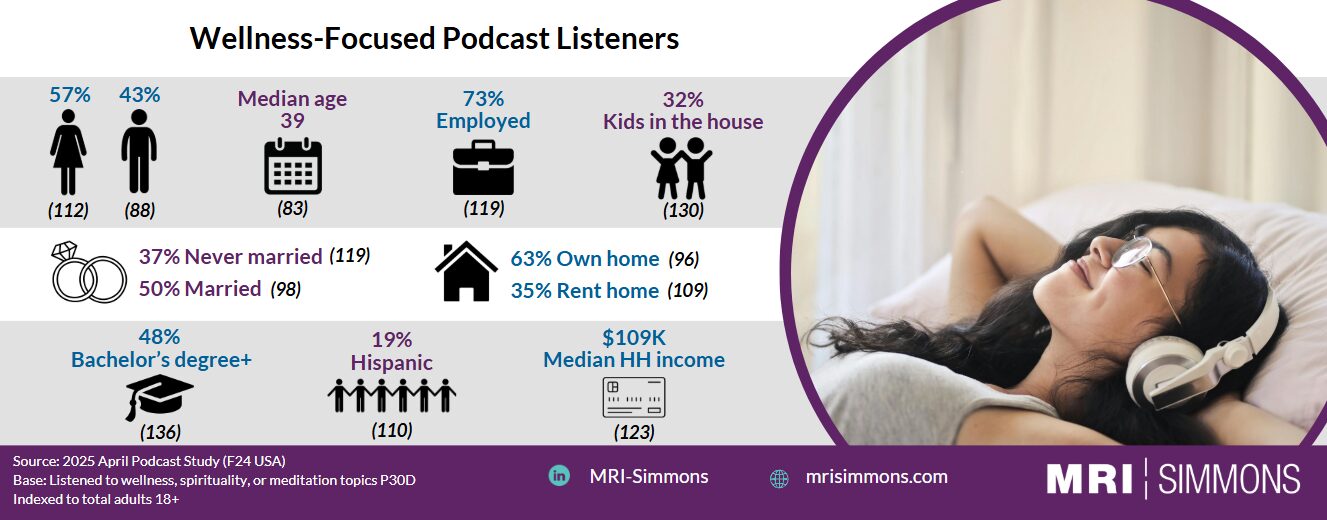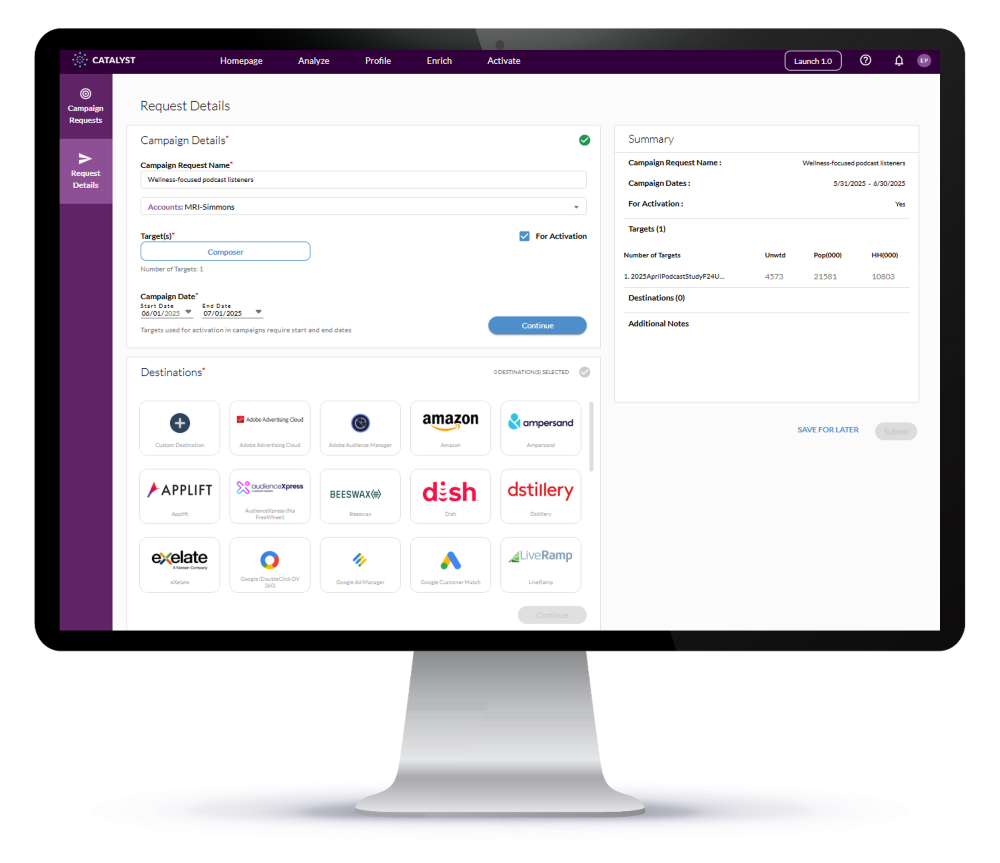Targeting Wellness Podcast Listeners Beyond Mental Health Awareness Month
May was Mental Health Awareness Month, and brands and advertisers have been (and should be) connecting with Americans who value mental wellbeing. But brands should not only focus on wellness consumers in May—brands can demonstrate their commitment to social responsibility all year long, building trust and loyalty among wellness-focused consumers. One way to continue reaching these consumers is through podcasts. With 1 in 3 American adults having listened to podcasts in the past month, and 25% of these listeners focusing on wellness, spirituality, and meditation content, this audience is not just significant—they're a treasure-trove for advertisers.
They listen on-the-go and crave connection
Imagine a listener on their morning commute, earbuds in, soaking up the latest episode on mindfulness. Compared to the average listener, these wellness podcast enthusiasts are 48% more likely to listen on public transportation and 42% more likely to listen while walking. This means your ads can reach them during those precious moments of daily routine, when they're most receptive and engaged. In fact, 71% of these listeners say podcasts are an important part of their daily routine, 13% more likely than the average podcast listener. And with 60% tuning in on YouTube, 51% on Spotify, and 40% on Apple Podcasts, the platforms for connection are as diverse as the listeners themselves.

These wellness-focused consumers crave inspiration and upliftment in their content, with 42% seeking these feelings from their podcasts—53% more likely than the average listener. They yearn for empowerment (145) and a sense of community (116), making them emotionally invested in the content they consume. In fact, podcasts are social for these listeners, with 77% often discussing their podcasts with others (115) and 53% inviting others to listen with them (115). Compared to the average podcast listener, they are 13% more likely to feel connected to other listeners of their podcasts (68%) and feel that podcast listening is a part of their identity (53%). Advertisers can take advantage of these ideas by promoting campaigns that focus on togetherness, empowering others, and finding life’s inspirations—all topics that relate to the season of mental health awareness.
While they listen to wellness-related topics on their podcasts, these consumers live with a “treat myself” mindset. According to MRI-Simmons’ syndicated segmentations, they are more likely to be categorized as “Passionate Travel Adventurers” (143), “Free-Spirited Shoppers” (120), and “Overextended Spenders” (116) than the average American adult. They define themselves as spenders rather than savers and have the tendency to impulse buy the items they really want, when they want them. This holds especially true when they receive a large sum of money, such as a tax refund during tax season. Their eagerness to buy makes these listeners a valuable audience for brands and advertisers.
Engaged and Trusting Audience
Engagement is the name of the game for wellness-focused podcast listeners. They're 81% more likely to follow 10 or more podcast programs and 15% more likely to dive into new episodes as soon as they drop. Some of their top over-indexing programs include wellness-focused titles like “We Can Do Hard Things with Glennon Doyle” (5%, 277), “Archetypes” (4%, 257), and “The Mel Robbins Podcast” (5%, 251). Their dedication to their podcasts is clear, but they are also discerning—they're 44% more likely to need four or more episodes to decide if a podcast is worth their time. These listeners take podcasts very seriously, with 72% listening for expert advice (124) and 70% finding podcasts more engaging than TV (116), indicating listeners seek similar levels of information and entertainment, and they trust what they’re hearing.
This trust extends to advertisements. Wellness-focused listeners are 42% more likely than the average listener to recommend a product after hearing a podcast ad, 40% more likely to make a purchase, and 37% more likely to look up a product on social media. They pay more attention to podcast ads than ads elsewhere (57%, 118), trust them more (56%, 119), and believe they influence their buying decisions (55%, 118). Advertisers can tap into this trusted and influential environment to promote products or services (especially ones that enhance mental wellbeing, knowing the audience is receptive and supportive of that topic).
Some brands have openly discussed and supported mental health initiatives, and their involvement has proven effective for wellness podcast listeners who over-index on purchasing from these brands. For example, Maybelline (21%, Index to total adults: 121) partnered with the WHO Foundation to expand access to mental health services, aiming to provide one-on-one support to millions in their “Brave Together” program. Lululemon (7%, 149) is another example as they have various initiatives focused on mental health, including their "Community Wellbeing Grant” which supports non-profit organizations that provide mental health resources and wellbeing tools. Brands that have a product, service, or partnership involving wellbeing can take the opportunity to reach likely supporters by targeting wellness-focused podcast listeners.
They are not just a target—they're the bullseye for advertising campaigns. Their high engagement, diverse interests, and responsiveness to ads make them an ideal audience for brands aiming to make a meaningful impact. And good news for advertisers – they are 33% more likely than the average listener to plan to listen to podcasts more in the next year than they did in the past year. As we continue celebrating emotional and spiritual health beyond Mental Health Awareness Month, consider tapping into this valuable audience to elevate your advertising strategies and connect with listeners who are truly tuned in.
Source: 2025 April Podcast Study (F24 USA); Base: Podcast listeners P30 days who listen to Wellness, Spirituality, or Meditation topics
Activating wellness podcast listeners through MRI-Simmons
Through MRI-Simmons' activation solution, ACT, marketers can leverage trusted and nationally representative data to target and reach podcast listeners who consume wellness content, invite others to listen with them, buy a product after hearing an ad, or any other target mentioned in this blog. Curate your audience with over 60,000 consumer elements: 1000+ attitudes and opinions, 6500+ brands in 1000+ product categories; and 90+ proprietary segments. Then, activate your audience via the ad tech platform or media partner of your choice.





